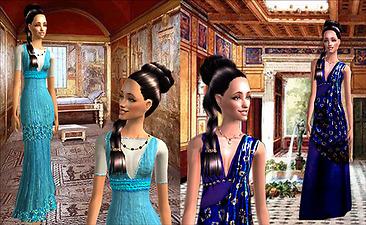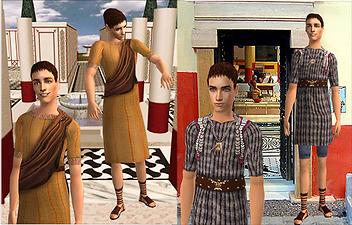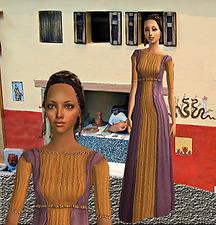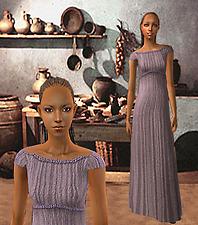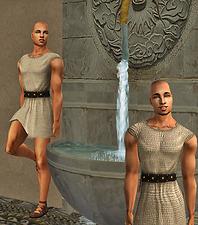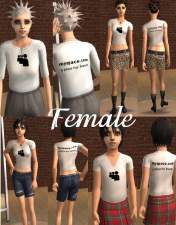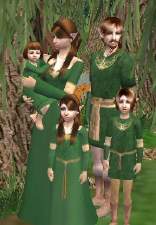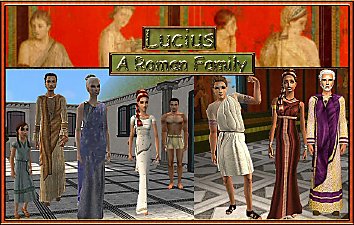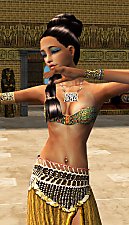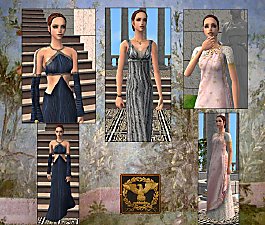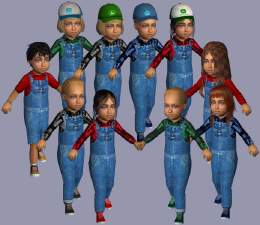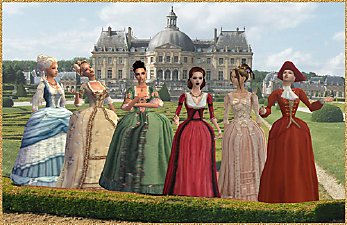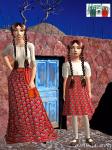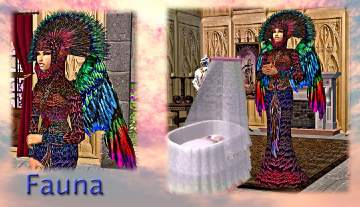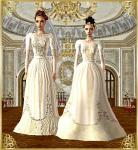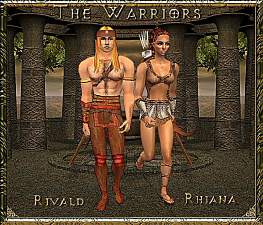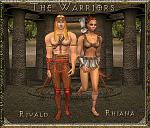 The Curius Family
The Curius Family

Curius.jpg - width=600 height=503

Gaia.jpg - width=600 height=369

Tiberius.jpg - width=600 height=383

af_Audia.jpg - width=577 height=600

af_Zara.jpg - width=527 height=600

am_SBBGaudio.jpg - width=527 height=600
I felt like making a roman house – because I’m in a Caesar IV mania – so I made up a story to go along with the family.
This is the Curius family. Tiberius Curius is a former soldier that used his “retirement” money to become a Well-to-do trader of pottery. His shop is in the front of the house.
He is married to Gaia, a beautiful but vain woman, that would not be caught dead working in the shop along side with her husband, so Tiberius sheltered Audia, the widow of one of his “comrade in arms” and she is working the shop.
Like most of his class, he has two slaves: Zara, a middle-eastern girl and Gaudio, from the tribes of the North, a giant that doubles as Tiberius body-guard when he has to go making business in the Subura, for instance.
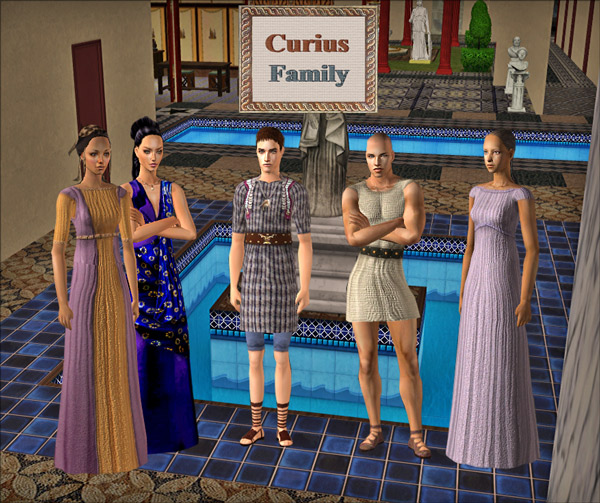
Bit of History
Roman society consisted of the few very rich persons, and a vast poor population, and the still vaster slave population that is estimated to have been almost equal to the free population. So it is fair to say that during Roman times, the average person in Italian Rome was poor.
The average free citizen lived in an apartment in an apartment block of up to five stories high (insulae). Any higher, and the stone and mortar would collapse from the weight of the structure.
Workshops and the homes of the artisans and their slaves occupied the ground floor level.
Early versions of these buildings were made of wood. And to the brick and mortar buildings, often wooden extensions were added on to the tops to provide more living space. But they were prone to fire and collapse, so they were discouraged by the local authorities.
Apartments would often consist of only one room inhabited by an entire family. The floors and walls were normally unfinished and undecorated.
Generally the conditions were unsanitary, noisy, smelly an unsafe.
There was no running water or indoor plumbing in these apartment blocks. Water had to be carried up in buckets. And usually a pot on the floor was used as a toilet, and then the contents dumped from the open window, that had no glass and usually only shutters or a curtain. They could also descend to use the public lavatories and baths.
They did not have access to kitchens, and cooking in the apartments was frowned upon because of the fire risk, and smoke that would fill the building. So they lived on prepared food bought from tavernae (pubs), or something like today's trattorie in Italy where many prepared items could be ordered wrapped up and taken home.
Wealthy Romans lived in homes (domus), or villas, or palaces.
The domus was an urban, two-story brick home built around an open courtyard that contained a fountain that was fed by rain water collected on the tiled roof. The homes usually had running water and indoor plumbing, and were often finished with murals and mosaic floors.
Villas were in the countryside on the farms. They consisted of a part for the land owner that resembled the domus, and a part for the farm workers that was less elaborate, and storage buildings for crops and animals.
Palaces were built in the cities by the richest citizens, usually on the hillsides around the towns, so they could enjoy breezes, less noise, and more space. They were richly finished with murals on the walls and mosaics on the floors. They were furnished with items from all over Rome's empire.
Mehes Needed:[/B]
[B]GaiaBlue - Mesh_Serasims_4RangesGown - Serasims (included)
GaiaMidNight - Mesh 016 http://www.lianasims2.com/mesh_page.html (included)
Zara - Mesh 016 http://www.lianasims2.com/mesh_page.html
Audia - Mesh 016 http://www.lianasims2.com/mesh_page.html
TiberiusBlue - The Simstones The Mod Squad http://www.modthesims2.com/showpost...11&postcount=13
TiberiusOcre - The Simstones The Mod Squad http://www.modthesims2.com/showpost...11&postcount=13
Gaudio - MTS2_515360_tiggerypum_tig-bodybuilder2 - http://www.modthesims2.com/showpost...370&postcount=8
Hope you like it and, as usual, please feel free to make all the comments you like (especially if they are nice!
Additional Credits:
To the mesh creators and to each and everyone that contributed to the programs I used and who have been helping me to learn how to make clothes
|
Mesh016_LianaSims2.zip
Download
Uploaded: 28th Jan 2008, 111.1 KB.
3,080 downloads.
|
||||||||
|
Mesh_Serasims_4RangesGown.zip
Download
Uploaded: 18th Dec 2007, 129.7 KB.
3,030 downloads.
|
||||||||
|
asr_amTiberiusOcre.zip
Download
Uploaded: 18th Dec 2007, 1.66 MB.
3,070 downloads.
|
||||||||
|
asr_amTiberiusBlue.zip
Download
Uploaded: 18th Dec 2007, 1.62 MB.
2,949 downloads.
|
||||||||
|
asr_amSBB_Gaudio.zip
Download
Uploaded: 18th Dec 2007, 410.9 KB.
3,044 downloads.
|
||||||||
|
asr_afZara.zip
Download
Uploaded: 18th Dec 2007, 808.8 KB.
3,213 downloads.
|
||||||||
|
asr_afGaiaMidNight.zip
Download
Uploaded: 18th Dec 2007, 682.8 KB.
3,020 downloads.
|
||||||||
|
asr_afGaiaBlue.zip
Download
Uploaded: 18th Dec 2007, 838.7 KB.
3,043 downloads.
|
||||||||
|
asr_afAudia.zip
Download
Uploaded: 18th Dec 2007, 889.7 KB.
3,134 downloads.
|
||||||||
| For a detailed look at individual files, see the Information tab. | ||||||||
Install Instructions
1. Download: Click the download link to save the .rar or .zip file(s) to your computer.
2. Extract the zip, rar, or 7z file.
3. Place in Downloads Folder: Cut and paste the .package file(s) into your Downloads folder:
- Origin (Ultimate Collection): Users\(Current User Account)\Documents\EA Games\The Sims™ 2 Ultimate Collection\Downloads\
- Non-Origin, Windows Vista/7/8/10: Users\(Current User Account)\Documents\EA Games\The Sims 2\Downloads\
- Non-Origin, Windows XP: Documents and Settings\(Current User Account)\My Documents\EA Games\The Sims 2\Downloads\
- Mac: Users\(Current User Account)\Documents\EA Games\The Sims 2\Downloads
- Mac x64: /Library/Containers/com.aspyr.sims2.appstore/Data/Library/Application Support/Aspyr/The Sims 2/Downloads
- For a full, complete guide to downloading complete with pictures and more information, see: Game Help: Downloading for Fracking Idiots.
- Custom content not showing up in the game? See: Game Help: Getting Custom Content to Show Up.
- If you don't have a Downloads folder, just make one. See instructions at: Game Help: No Downloads Folder.
Meshes needed
This download requires one or more meshes to work properly. Please check the Description tab for information about the meshes needed, then download them below:| MTS cannot guarantee any off-site links will be available |
| lianasims2.com/mesh_page.html (non-MTS link) |
| serasims.de (non-MTS link) |
Loading comments, please wait...
Uploaded: 18th Dec 2007 at 1:04 PM
Updated: 28th Jan 2008 at 1:25 PM
#historical, #roman, #rome, #history
-
by Dragonfly Fairy 2nd Feb 2006 at 4:02am
 13
5k
3
13
5k
3
-
by Dragonfly Fairy 4th Feb 2006 at 7:43am
 4
2.9k
1
4
2.9k
1
-
by Dragonfly Fairy 4th Feb 2006 at 7:55am
 5
3.9k
5
3.9k
-
by penguiny7 22nd May 2006 at 8:59pm
 9
23.3k
16
9
23.3k
16
-
by alexasrosa 20th Oct 2006 at 2:24pm
 +1 packs
13 49.2k 33
+1 packs
13 49.2k 33 University
University
-
by alexasrosa 10th Dec 2006 at 1:10pm
 50
213.8k
144
50
213.8k
144
-
by alexasrosa 28th Feb 2007 at 2:22pm
 29
53.4k
48
29
53.4k
48
-
by alexasrosa 14th Mar 2007 at 6:54pm
-
by Dr Pixel 3rd Dec 2008 at 5:25am
 10
19.8k
9
10
19.8k
9
-
by alexasrosa 20th Apr 2007 at 1:09pm
Hi Some of you asked me - several times - for more Rococo style costumes. more...
-
Request by ElizabethHg14 - 1820's Mexican dress
by alexasrosa 13th Nov 2006 at 8:40pm
Hi all In the spirit of Thanksgiving, and thanking all the wonderful and talented creators that throughout the world more...
-
The paintings - Lawrence's Red Boy
by alexasrosa 24th Nov 2006 at 10:01pm
Hi People asked for it, to go along with the BlueBoy and Pinkie. So here it is. more...
-
by alexasrosa 9th Nov 2006 at 7:12pm
Hi ! more...
-
by alexasrosa 1st Feb 2007 at 1:45pm
:alarm: NOTE: The bassinet in the photos is a photoshop collage. more...
-
Roman Black Emperor "Gladiator"
by alexasrosa 20th Nov 2005 at 2:28pm
Hi This is the outfit used in the film "Gladiator" by the evil Emperor. more...
-
by alexasrosa 16th Oct 2006 at 2:48pm
:alarm: Added Besen's Teen Mesh Someone asked me if I could make her some brides for teens more...
-
The Warrior series - Rivald & Rhiana
by alexasrosa 10th Oct 2006 at 1:25pm
This series deserves a previous explanation. more...
 6
19.2k
11
6
19.2k
11
-
by alexasrosa 8th Feb 2006 at 2:06pm
Hi Here's a Red & Black Mini, for Young Adults. more...
 +1 packs
7 18.4k 19
+1 packs
7 18.4k 19 University
University
About Me
To all those who did not read my last journal entry: I’m not making Sims clothes anymore. As a matter of fact, I don’t even have the game installed.
The clothes I uploaded to this site can be freely used – a note telling they are mine would be nice. Regarding the meshes…well, if they are out of the air, maybe you can try the graveyard or ask around for those who have them. They are not mine, so I really can’t help you.
Thanks so much for all your support, and if you want to see what I’ve been doing, you can visit my gallery at http://alexasrosa.deviantart.com/

 Sign in to Mod The Sims
Sign in to Mod The Sims The Curius Family
The Curius Family
